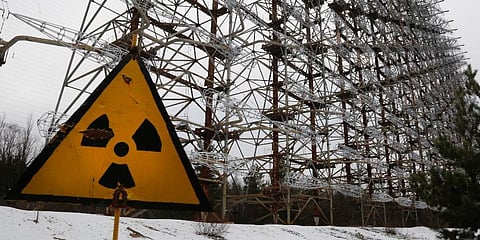

While the situation for the staff at the Chernobyl Nuclear Power Plant was stated to be worsening, Ukraine has said that the plant was completely left without electricity as a result of "hostile actions of the Russian occupiers."
The staff had access to food and water, and medicine to a limited extent. However, the situation for the staff was worsening. Ukraine has asked International Atomic Energy Agency (IAEA) to lead the international support needed to prepare a plan for replacing the current personnel and for providing the facility with an effective rotation system, a statement issued by IAEA said.
"As a result of hostile actions of the Russian occupiers, the Chornobyl Nuclear Power Plant was completely left without electricity," National Power Company Ukrenergo posted on Telegram, Ukraine's national news agency Ukrinform reports.
The fighting continues, so it is currently impossible to carry out repair works and restore the electricity supply. Ukrenergo closely follows the situation and will inform on updates, the agency reports.
IAEA has lost track of the remote data transmission from the security control systems of the Chornobyl plant.
IAEA confirmed that remote data transmission from safeguards monitoring systems installed at the Chornobyl NPP had been lost. The Agency is looking into the status of safeguards monitoring systems in other locations in Ukraine and will provide further information soon, a statement issued by IAEA said.
The agency also noted that Ukraine has informed on Tuesday that it was becoming increasingly urgent and important for the safe management of the Chornobyl plant to rotate some 210 technical personnel and guards who have been working there since Russian forces took control of the site almost two weeks ago.
IAEA Director General Rafael Mariano Grossi said, in contrast, to the current situation for staff at Ukraine’s operating nuclear power plants who are rotating regularly, the same shift has been on duty at the Chornobyl NPP since the day before the Russian military entered the site of the 1986 accident on 24 February, in effect living there for the past 13 days.
Grossi has repeatedly stressed that staff operating nuclear facilities must be able to rest and work in regular shifts, stating this is crucial for overall nuclear safety. Their capacity to make decisions free of undue pressure is among the seven indispensable pillars of nuclear safety and security he outlined at a meeting of the IAEA’s Board of Governors on 2 March, convened to address the safety, security and safeguards implications of the situation in Ukraine.
“I’m deeply concerned about the difficult and stressful situation facing staff at the Chornobyl nuclear power plant and the potential risks this entails for nuclear safety. I call on the forces in effective control of the site to urgently facilitate the safe rotation of personnel there,” he said.
The handling of nuclear material at the Chornobyl NPP has been put on hold for the time being, the regulator added. The site, located in an Exclusion Zone, includes decommissioned reactors as well as radioactive waste facilities. The regulatory authority said it could only communicate with the plant via e-mail.
To help protect the country’s nuclear facilities, the Director General has expressed his readiness to travel to the Chornobyl NPP, or elsewhere, to secure the commitment to the safety and security of all Ukraine’s nuclear facilities from the parties of the conflict.
Regarding the status of Ukraine’s operational nuclear power plants, the regulator said eight of the country’s 15 reactors were operating, including two at the Zaporizhzhya NPP controlled since last week by Russian forces, and that the plants’ personnel were working in shifts. Radiation levels at the sites were normal, it said.